
SUNDAY, July 25 (HealthDay News) — Extreme summer heat can place older people at increased risk for developing the dangerous high body temperature condition known as hyperthermia, experts at the U.S. National Institute on Aging (NIA) warn.
As a result of the body’s inability to regulate body temperature following exposure to very hot weather, the elderly may face a number of related health problems, including heat fatigue and exhaustion, sudden dizziness (known as “heat syncope”), heat cramps, and heat stroke (when body temperature rises above 104 degrees Fahrenheit), the agency cautions.
That said, the NIA is highlighting certain steps that can be taken to reduce the risk for those most vulnerable.
In a news release from the agency, experts advise that elderly individuals — especially those coping with chronic heart, lung and/or kidney diseases, as well as sweat gland problems and poor circulation — should stay indoors on very hot and humid days, as well as on those occasions when pollution advisories are in effect.
If air conditioning is unavailable at home, the NIA suggests that seniors try to take advantage of cooler locales, such as senior centers, malls, movie theaters, churches and religious facilities, social service organizations, and libraries.
Drinking a lot of fluids, while avoiding alcohol and caffeine, is also critical, as is dressing appropriately and avoiding crowds.
Older men and women who routinely take medications for a variety of health conditions are advised not to stop taking their drugs without first consulting their physician. However, elderly patients should nonetheless be aware that diuretics, sedatives, tranquilizers, and blood pressure medications can in some cases elevate the risk for developing hyperthermia.
Anyone thought to be suffering from a heat-related condition should be brought to a shaded or air-conditioned location, and encouraged to lie down and cool off by using a sponge and cool water, or a shower or bath, if possible. If heat stroke is suspected, call 911.
The NIA also notes that those in need can be helped by applying a cold wet cloth to those body parts where the blood circulates close to the skin surface, such as the wrist, neck, armpit and groin areas.
More information
For more on hyperthermia and the elderly, visit the U.S. National Institute on Aging.

